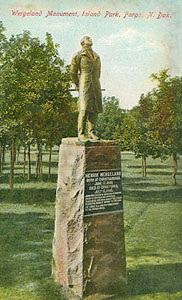"Storm the bitter heights of lies!
Raze them to the ground with Truth!"
-- from the poem "The Army of Truth"
This is one of two very short books I read in wrapping up my Classics Club list, but since I'm on this earth to promote lesser-known classics, which they are, I'm calling it fair!
In November, I did a short program at the Sons of Norway on Norwegian poet Henrik Wergeland (1808-1845), inspired by the prominent statue of him that stands in a local park. Although he was a famous writer, and has been called "the father of Norwegian culture," The Army of Truth is literally the only collection of his work that I've been able to find translated into English. It's subtitle, "Dedicated to obtaining equal rights for Jews in nineteenth-century Norway," describes the contents, which are mostly poems related to this crusade
Wergeland's father, a Lutheran minister, had been involved in drafting the clause in their Constitution barring Jews (along with Jesuits) from entering Norway, and the younger Wergeland, whose public activism helped establish Syttende Mai, the day honoring that Constitution, worked -- sources always say "tirelessly" -- to overturn it, in the interests of humanity, equality, and democracy. In short, a good guy to be honored in the park.
The poems in this collection are varied in style, and while the preface suggests that much of Wergeland's literary skill is lost in translation, Anne Born's work here is very readable, suggesting a flavor of its time without tripping one up in the archaic.
Two of the poems are set at Christmas, hence today's posting. "Christmas Eve" is a narrative that reminds me of Wordsworth's story-poems, but without the sometimes simplistic rhymes. Its tale of prejudice leading to an ironic tragedy is prefaced by a dramatic meditation:
"Who can't remember
A storm far worse than any Heaven can send?
A storm as if each soul from Cain's to the one
God last condemned,
for cursing Earth, might have escaped from Hell,
and tempted them to turn their back on Heaven?" (12)
"Every religion has a gentle and loving heart" (5), he states, including Muslims, Hindus, and other further-flung groups, although he's hard on those Christians whose hearts are "ice ... or lumps of snow,/stones, within whose crannies dwell/swarms obscene from blackest hell" (22).
This edition from the University of Wisconsin Press was copublished with Thanks to Scandinavia, a group "honoring the rescues of Jews in Scandinavian countries during World War II."

No comments:
Post a Comment